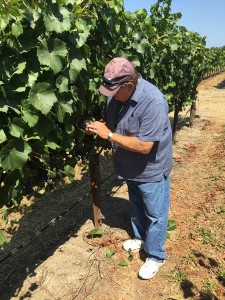Thermaculture® Proven Effective Control for Powdery Mildew

NAPA, Calif., November 12, 2018 (Newswire.com) - The late Dr. Doug Gubler established replicated trials in 2017 on Chardonnay, Pinot Noir and Cabernet Sauvignon at two Foley Family Wines vineyards to determine if Thermaculture, or instantaneous heat shock treatments, could be used to reduce traditional fungicide applications. Upon his recent death on July 19, Tome Martin-Duvall and John Monnich of Caltec Ag, based in Modesto, California, took over the final evaluation of the project. The work was done in both Sonoma and Napa.
According to Martin-Duvall, "In 2017 and 2018, there was insignificant incidence of powdery mildew in the Cabernet Sauvignon and Pinot Noir in both the 100 percent fungicide control blocks and the heat treated/reduced fungicide blocks. However, in 2018, there was significant PM Hyphae infestation in the Chardonnay control blocks and no infestation in the heat-treated blocks. Thus, in my view, the heat and fungicide combination is more effective than fungicide alone at preventing powdery mildew from developing." The test protocols used 11 heat treatments and cut out four fungicide passes when compared to the grower's conventional program.
... in my view, the heat and fungicide combination is more effective than fungicide alone at preventing powdery mildew from developing.
Tome Martin-Duvall, Caltec Ag Inc.
"Past experiments done by Agrothermal Systems have shown that Thermaculture kills PM spores and provides effective prevention for about 6 days before spores get re-established. In the test designed by Dr. Gubler, 11 heat applications provided about 66 days of protection between bud break and veraison and the rest of pre-veraison control was provided by fungicide. Heat was alternated with fungicide and the combination provided two years of 100 percent infestation-free control for all three varieties," says Martin-Duvall. "In addition to PM prevention, we also experimented with killing PM Hyphae in the infected control blocks of Chardonnay and found Thermaculture killed Hyphae as effectively as chemical treatments. This needs more study, but it was quite surprising to see 100 percent kill of Hyphae with heat treatments and no apparent effects to the grapes and grape vine." Martin-Duvall is preparing a final report on the two-year study and will make this available as soon as it is completed and submitted for scientific publication.
Marty Fischer, CEO of Agrothermal Systems, confirmed the importance of this work. "I only wish Doug was here to enjoy these findings. Clearly, Thermaculture can play a major role in protecting against powdery mildew and will reduce the amount of fungicide being used on wine grapes and other crops. Heat provides a completely different kill mechanism and, in rotation with fungicide, will reduce the ability of PM to become resistant to repeated use of fungicide." The economics are also in favor of a heat treatment approach, claims Fischer. "The material cost for propane to heat air is only $4-$5 per acre compared to pesticides that can run $40 or more per acre. In addition, the benefit of Thermaculture can also include insect control, increases in yields and fruit that is higher in flavonoids, including phenol and antioxidants."
Looking to the future, Patrick Baker, VP of sales at Agrothermal Systems, said "We will continue experimenting with additional reductions in fungicide/heat combinations to see if more chemical reduction is possible. It is our belief, substantiated by anecdotal grower experimentation, that heat alone may be a real possibility to control PM on many wine grape varieties, especially if heat can be used to burn out Hyphae as our early experiments indicate. This underlines our belief that Thermaculture should be the central tool in an IPM program."
Agrothermal Systems is based in Napa, California, and is a dba of Lazo TPC Global Inc., a California corporation. Agrothermal has pioneered the use of Thermaculture as a means to improve wine quality, increase yields, reduce pesticide needs and manage crop damage from inclement weather events. The company holds patents on Thermal Pest Control and has patents pending on Thermal Plant Treatment for agricultural crops.
Source: Agrothermal Systems